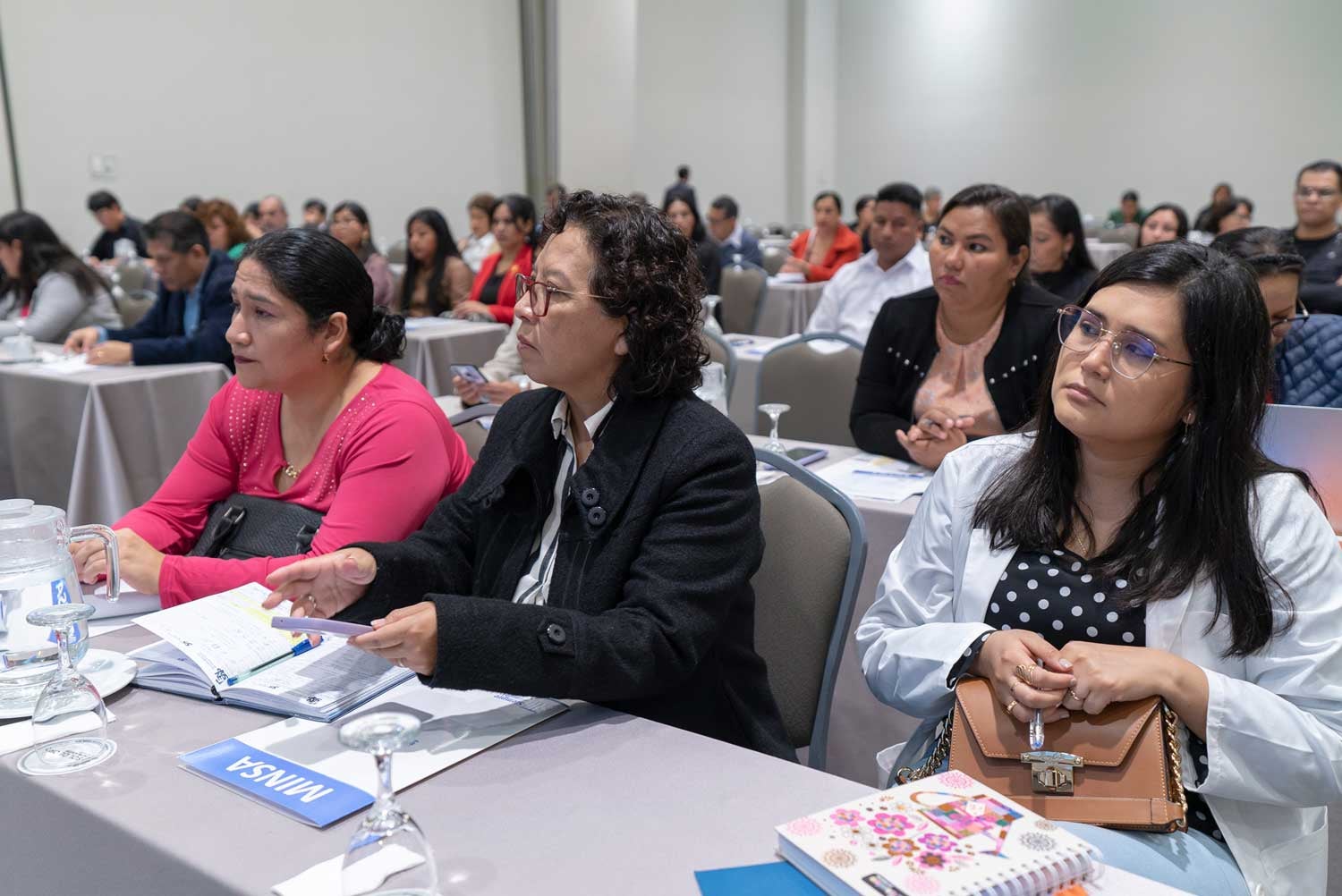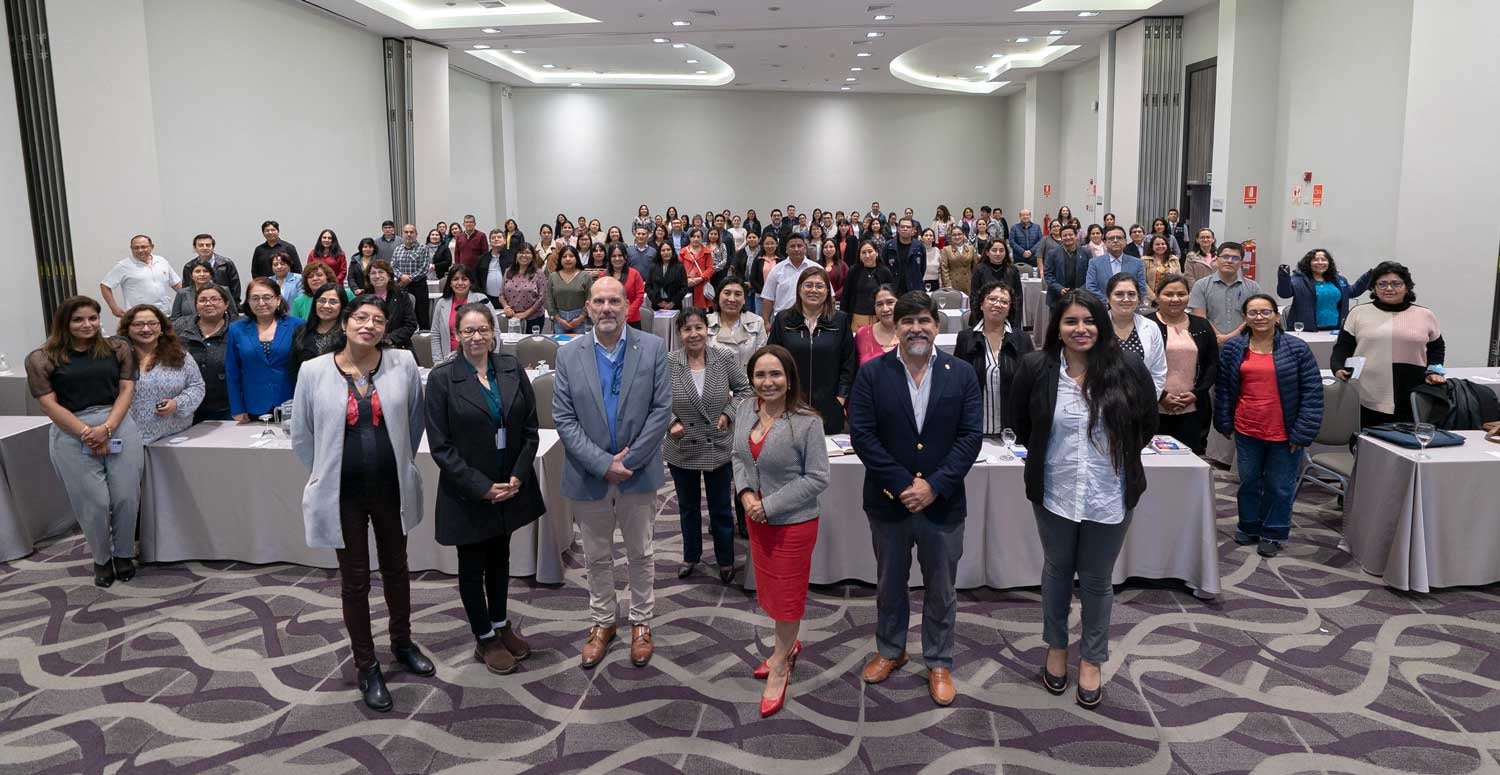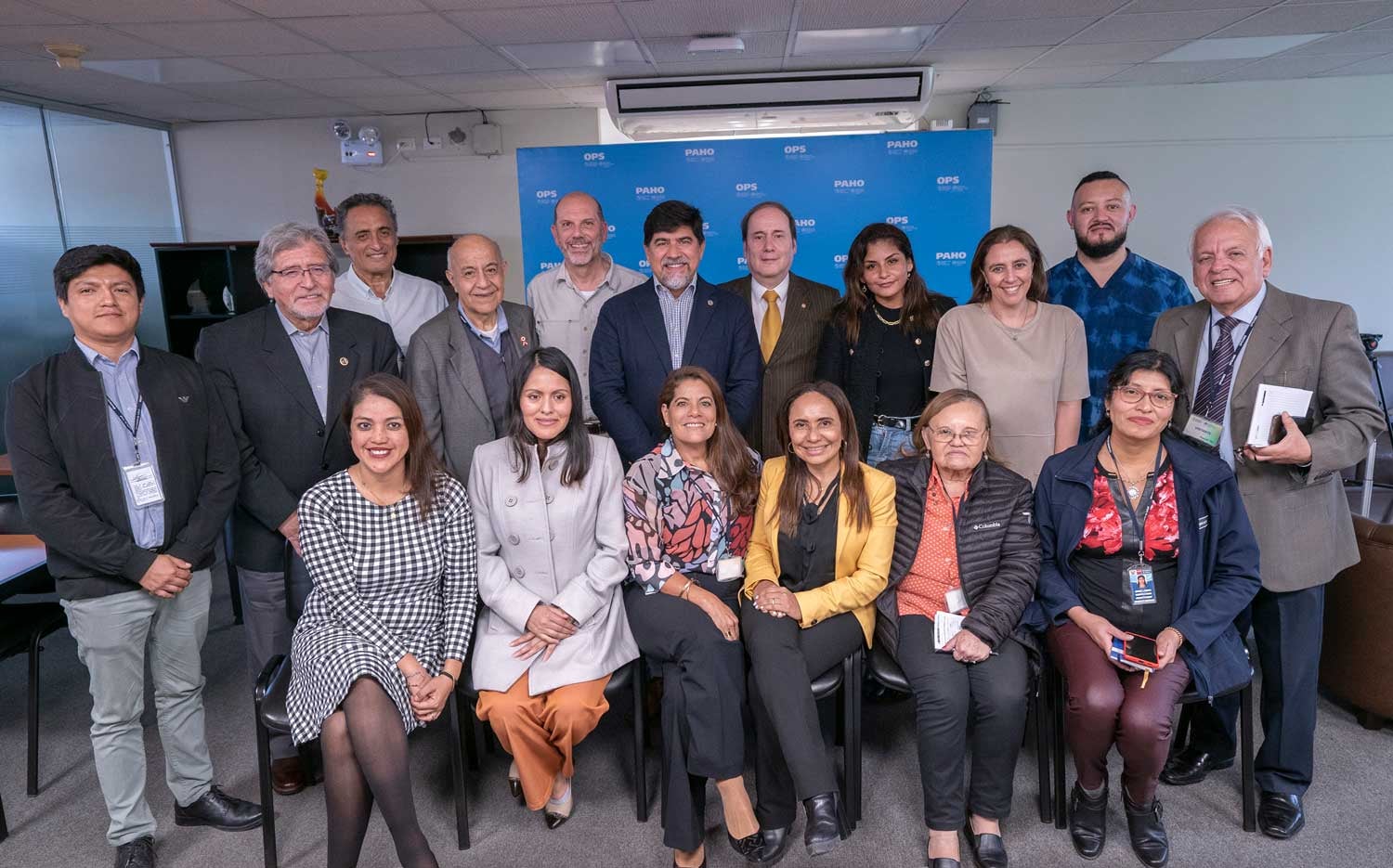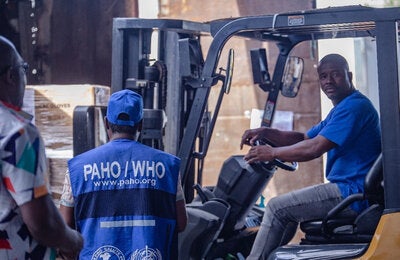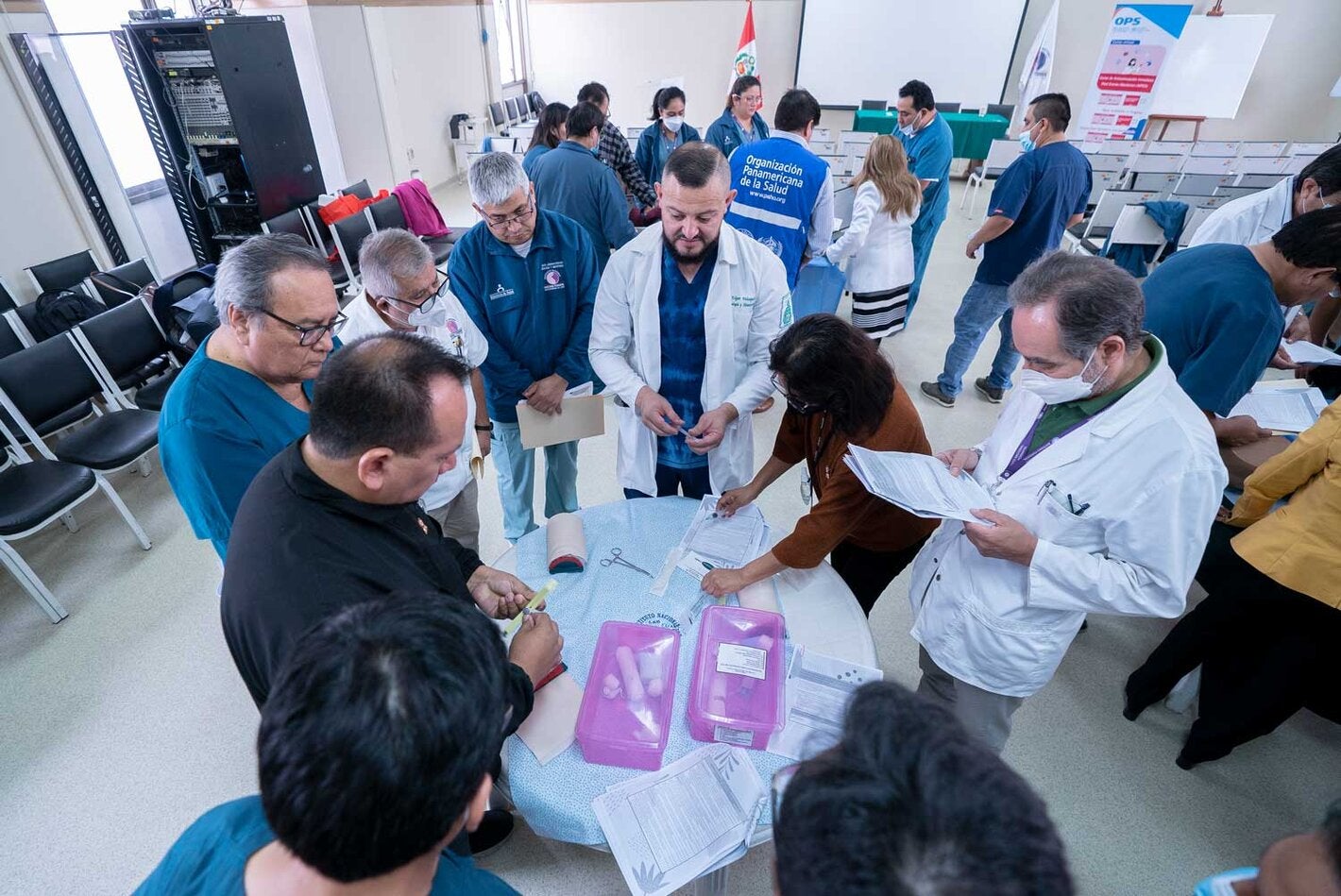
Lima, July 14, 2023.-
In the framework of the technical cooperation provided by the Pan American Health Organization (PAHO) to Peru, a team of specialists from the Latin American Centre for Perinatology, Women's Health and Reproductive Health (CLP/WR) was present during the week of 10 July 2023 in various capacity building and experience sharing activities.
In search of improved indicators on extreme maternal morbidity and maternal death
To strengthen epidemiological surveillance of extreme maternal morbidity and maternal mortality in the country, on 10 and 11 July, PAHO facilitated a workshop in Lima that brought together obstetrician-gynecologists, heads of obstetrics and gynaecology departments, and obstetrics graduates from different hospitals and health centres in the country, in coordination with the authorities of the National Centre for Epidemiology, Prevention and Disease Control (CDC) of the Ministry of Health (Minsa).
In this space, Dr. Bremen De Mucio, regional advisor for Maternal Health of PAHO's CLP, presented the global and regional situation of extreme maternal morbidity and its epidemiological surveillance. He analysed the challenges in the implementation of the Near-Miss Maternal Case Registry and the importance of establishing an effective strategy to identify the causes and possible responses to reduce preventable deaths.
"Peru has made progress in the surveillance of extreme maternal morbidity. It now has a system in place with a regulatory decree that allows for nationwide implementation. There is political will from the Ministry of Health and now health personnel are required to identify, record, report and act on these cases," said the specialist.
De Mucio also gave an update on the status of maternal mortality and its epidemiological surveillance in the Americas region and globally.
"Maternal mortality is a public health problem that has multiple causes and requires a multisectoral approach. From the United Nations, and specifically from PAHO, we propose an approach that involves the participation of various actors that are not only from the health sector (...) Peru must continue to face the challenges that affect maternal mortality and implement actions to accelerate its reduction, not only to meet the agreed goals but also to prevent women from dying".
As a result of the workshop, commitments were made to continue implementing epidemiological surveillance of maternal morbidity. These include the supervision of compliance with the deadlines for the implementation of surveillance in the Regional Health Directorates (Diresas) and Regional Health Managements (Geresas) that have less notification. The CDC also indicated that it will continue to invest in the development and improvement of its epidemiological surveillance application, said Obstetrician Fabiola Gil Cipirán.
At the end of the event, Dr. Gabriela Soto Cabezas, head of the Public Health Surveillance Team at the CDC, welcomed PAHO's technical support. "It helps us to know the procedure for implementing the regulations that have been approved for several years, which are expected to reduce maternal morbidity in the country. Maternal mortality is an important public health event, because when a mother loses her life, it also has an impact on her family and community. This harm is preventable.
Continuing their visit to the country, on 12 July, PAHO specialists took part in the International Conference on Obstetrics and Gynaecology held in Lima. On this same topic, Dr. Bremen De Mucio gave a presentation on the surveillance of extreme maternal morbidity in the region where, despite efforts, progress is insufficient. He stressed that reducing maternal mortality is not only a matter of achieving goals but also of fulfilling rights.
"Women are still dying from causes that are entirely preventable and for which we know what interventions we can do," he said.
AIPEO in Peru
Dr. Rodolfo Gómez Ponce de Leon, Regional Advisor on Sexual and Reproductive Health at PAHO's CLAP, provided details on the situation of safe abortion care in Latin America and the Caribbean.
"In the Americas there are great inequalities, but progress has been made in access to safe abortion in several countries in recent years. Peru has a legal indication for safe therapeutic abortion to save a woman's life. For this, they have clinical guidelines and access to training for professionals to take into consideration the WHO recommendations, providing humanised and quality care to women who go through these events," said Dr. Gomez, who also stressed the importance of health professionals being trained in family planning and immediate post-obstetric contraception (AIPEO, for its acronym in Spanish), which guarantees the protection of reproductive rights, especially in the most vulnerable populations.
"Through PAHO's Virtual Campus, we have two virtual courses for health personnel at the first level of care. The first one provides training for the health team in family planning and the second one on immediate post-obstetric event contraception (AIPEO) for doctors who attend births and abortions in hospitals. The latter will benefit a group of women by providing them with greater security of access to the most effective methods of contraception immediately after childbirth or abortion," the specialist added.
The following day, Dr. Rodolfo Gómez, led the workshop on AIPEO for medical specialists and residents of the gynaecobstetrics specialisation of the Instituto Materno Perinatal, who expressed their interest in training to become experts in the application of immediate contraception. With this first step, the institute aims to become the first reference centre for AIPEO qualification in the country.
This simulation workshop, which also had the technical assistance of Dr. Edgar Velásquez, AIPEO certified trainer, and Dr. Verónica Fiol, specialist from CLP's Sexual and Reproductive Health team, included theoretical and practical sessions in order for participants to develop skills and abilities in the application of the Intra Uterine Device and subdermal implants after childbirth and post-abortion.
This action is part of the Improving the Health of Women and Adolescent Girls in Vulnerable Situations project, supported by Global Affairs Canada.
In this regard, the director of the INMP, Félix Ayala, thanked PAHO for accepting the request for such training for the professionals of the institution, which attends 13,000 births per year.
"The task we have is to train tutors, and for them to multiply at the national level and advance the health strategy of immediate post-obstetric contraception. The aim as a country is to become the first national training centre, responding to the commitment given that PAHO/WHO is providing us with technical assistance to achieve this goal," Ayala said.
Final agreements and commitments of the visit
At the end of this visit, the PAHO country office and the Latin American Centre for Perinatology, Women's Health and Reproductive Health (CLP/WR) of the Pan American Health Organization (PAHO) stated that they will continue to provide technical cooperation in the country in order to contribute to improving access to and quality of reproductive, maternal and neonatal health care services and to reverse the causes of maternal morbidity and mortality. It will also contribute to the strengthening of the surveillance system, as well as to the availability of high quality data to respond to women's needs and priorities and to assertive decision making. This is required in order to achieve the Sustainable Development Goal targets and move towards universal health.

